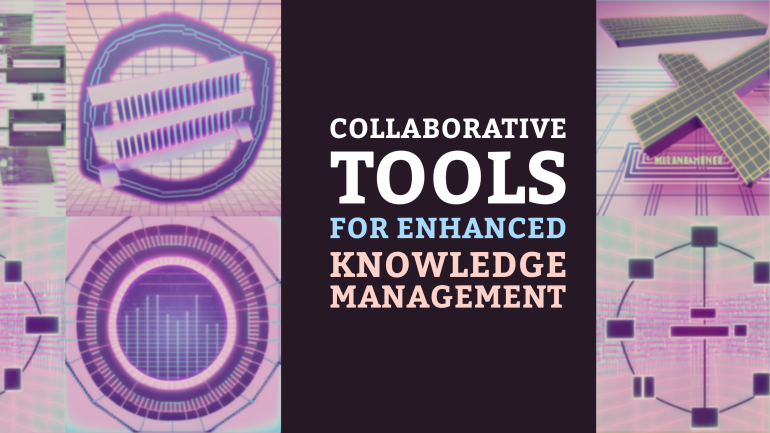Table of Contents
TL;DR: Harnessing Collaborative Tools for Optimal Knowledge Management
- Increased Efficiency: Collaborative tools streamline communication and knowledge sharing among team members, leading to increased productivity and efficiency.
- Improved Collaboration: These tools enable real-time collaboration, allowing team members to work together seamlessly regardless of their physical location.
- Centralized Information: Knowledge management tools provide a central repository for all information, making it easier for team members to access and share knowledge.
- Enhanced Decision-Making: By providing access to accurate and up-to-date information, collaborative tools help in making informed decisions quickly and effectively.
- Encouraging Innovation: Collaborative tools foster a culture of creativity and innovation within teams by facilitating brainstorming sessions and idea sharing.
It’s necessary for organizations to harness the power of collaborative tools to effectively manage knowledge in the digital age. By utilizing these tools, businesses can streamline communication, facilitate knowledge sharing, and enhance productivity among team members. In this informative blog post, we will explore the various collaborative tools available to help organizations optimize their knowledge management processes and achieve their strategic goals.
Foundations of Collaborative Knowledge Management
Definition and Key Concepts
Knowledge management involves the systematic process of creating, sharing, using, and managing knowledge to enhance an organization’s effectiveness. It encompasses the strategies and practices used to identify, capture, store, and distribute knowledge within a company. Key concepts include knowledge creation, sharing, dissemination, and utilization.
The Role of Technology in Knowledge Sharing
Technology plays a crucial role in knowledge sharing by providing platforms and tools that facilitate communication, collaboration, and information exchange among employees. These tools include intranet portals, document management systems, online forums, and collaborative software solutions. By leveraging technology, organizations can break down silos, connect dispersed teams, and enable seamless sharing of knowledge across departments and geographical locations.
Assessing Collaborative Tools
Criteria for Effective Collaboration
Collaboration is necessary in today’s fast-paced work environment, and the right tools can make all the difference. Key criteria for effective collaboration tools include ease of use, real-time communication capabilities, integration with existing systems, scalability, and robust security measures.
Review of Popular Collaborative Tools
Tools such as Slack, Microsoft Teams, Google Workspace, and Trello are highly popular in the business world for enabling seamless collaboration among team members. These tools offer features like shared workspaces, task assignment, file sharing, chat functionality, and integration with third-party apps.
The choice of the collaborative tool depends on the specific needs of the team and the nature of the projects they are working on. Each tool has its strengths and limitations, so it’s necessary to evaluate them against the criteria for effective collaboration to determine the best fit for your organization’s knowledge management needs.
Implementing Collaborative Tools for Knowledge Management
Strategies for Successful Implementation
The successful implementation of collaborative tools for knowledge management requires a well-thought-out strategy. All stakeholders must be aligned in terms of the tools to be used, the processes to be followed, and the goals to be achieved. Training and clear communication are crucial to ensure that all team members understand the purpose and benefits of the tools being implemented.
Challenges and Solutions in Adoption
One common challenge in the adoption of collaborative tools for knowledge management is resistance to change. Team members may be accustomed to existing processes and reluctant to embrace new ways of working. However, with proper change management strategies and continuous support and guidance, this challenge can be overcome.
This resistance often stems from a fear of the unknown or perceived complexity of the new tools. Providing thorough training, ongoing support, and demonstrating the tangible benefits of the tools can help alleviate these concerns and encourage adoption across the organization.
Advancing Knowledge Management Practices
Integrating Collaborative Tools with Existing Systems
Not only are collaborative tools vital for enhancing knowledge management practices, but integrating them with existing systems can further streamline information sharing and collaboration within organizations. By seamlessly merging collaborative tools with traditional knowledge management systems, companies can create a more efficient and productive work environment.
Predicting Future Trends in Collaborative Technology
Collaborative technology is constantly evolving, and it is crucial for organizations to stay ahead of the curve by anticipating future trends in this space. By analyzing market data and industry reports, companies can make informed decisions about which tools to invest in and how to adapt their knowledge management strategies accordingly. Keeping an eye on emerging technologies such as artificial intelligence and virtual reality can also provide valuable insights into the future direction of collaborative tools.
Knowledge management practices are continuously evolving, and staying up-to-date with the latest trends in collaborative technology is vital for organizations looking to optimize their information sharing and collaboration processes. By integrating cutting-edge tools with existing systems and anticipating future trends in technology, companies can ensure they are well-equipped to meet the challenges of the digital age.
Summing up
Ultimately, the use of collaborative tools for enhanced knowledge management offers organizations a strategic advantage in today’s constantly evolving business landscape. By facilitating seamless communication, promoting knowledge sharing, and streamlining project management processes, these tools empower teams to work more efficiently and effectively. The ability to capture, store, and access valuable information in a centralized repository ensures that insights are not lost but rather leveraged to drive innovation and decision-making. As a result, organizations can improve their overall productivity, foster a collaborative work culture, and ultimately achieve their business objectives more successfully. Embracing collaborative tools for knowledge management is not just a trend but a necessity for staying competitive and relevant in the digital age.
FAQ
Q: What are collaborative tools for enhanced knowledge management?
A: Collaborative tools are software and platforms designed to facilitate communication, information sharing, and collaboration among team members to improve knowledge management within an organization.
Q: How do collaborative tools help in knowledge management?
A: Collaborative tools streamline communication, enable real-time collaboration, centralize information storage, enhance knowledge sharing, and promote teamwork, leading to more efficient knowledge management processes.
Q: What are some examples of collaborative tools for knowledge management?
A: Examples of collaborative tools include project management software (e.g., Trello, Asana), document sharing platforms (e.g., Google Drive, SharePoint), instant messaging apps (e.g., Slack, Microsoft Teams), and video conferencing tools (e.g., Zoom, Skype).
Q: How can organizations benefit from using collaborative tools for knowledge management?
A: Organizations can benefit from improved productivity, enhanced teamwork, increased innovation, better decision-making, reduced duplication of efforts, and more effective knowledge sharing by leveraging collaborative tools for knowledge management.
Q: What are some best practices for implementing collaborative tools for enhanced knowledge management?
A: Best practices include identifying the organization’s specific needs, providing training and support to employees, integrating collaborative tools into existing workflows, promoting a culture of collaboration, ensuring data security and privacy, and regularly evaluating and optimizing tool usage for continuous improvement in knowledge management processes.





